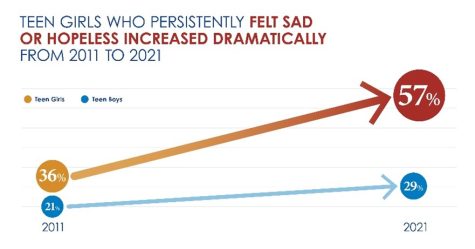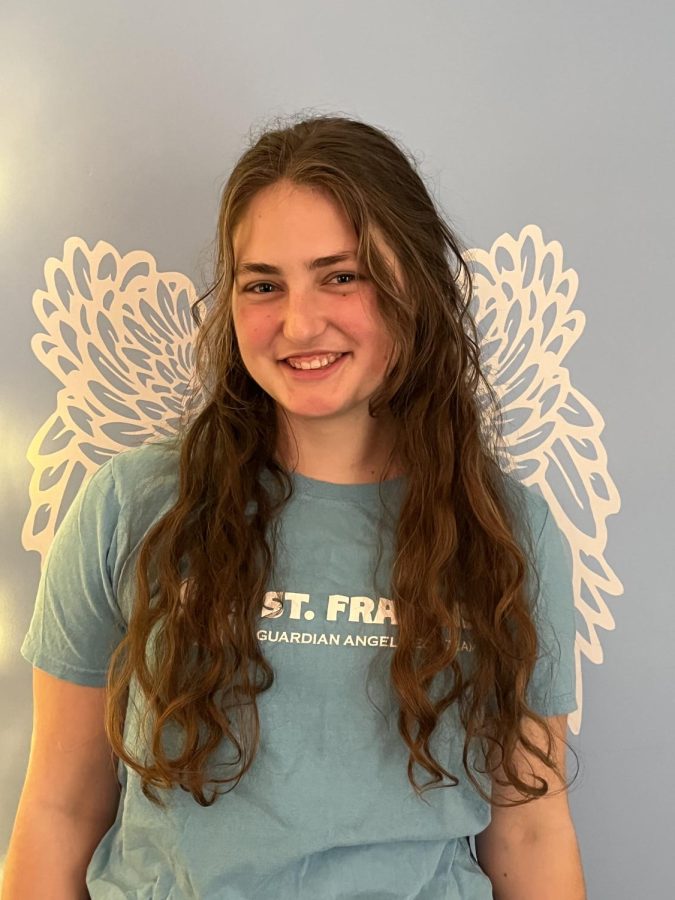As need for mental health resources grows, schools search for cost-effective support
February 26, 2023
As the mental health challenges faced by teens seem to be growing worse, schools around the country– including St. Francis all-girls Catholic High School – have pursued new strategies to help students cope.
A Feb. 13 CDC report found 57% of U.S. teen girls felt persistently sad or hopeless in 2021. That was double the rate among boys, a nearly 60% increase from 2011, and the highest level in the past decade.

The rise in mental health challenges is not attributable to one culprit alone. Experts say it has many origins, including the pandemic, social media toxicity, racial and gender inequality, and school shootings.
“Young people are experiencing a level of distress that calls on us to act with urgency and compassion,” CDC Division of Adolescent and School Health Director Kathleen Ethier said in a press release accompanying the report. “With the right programs and services in place, schools have the unique ability to help our youth flourish.”
At the same time the need for mental health services has increased, schools confront the problem of how to sustain wellness programs after September 2024, when Covid relief funds earmarked for mental health services disappear. https://www.axios.com/2023/02/02/funding-cliff-student-mental-health
Funding is sorely needed in California, where there remains a severe need for access to counselors.
A national ranking released by the American School Counselor Association put California near the bottom in student-to-counselor ratio for the 2021-2022 school year. California schools had 509 students for every counselor, higher than the national average of 408-to-1, and more than double the Association’s recommended ratio of 250-to-1. Only six states had higher ratios than California:
https://www.schoolcounselor.org/getmedia/b9d453e7-7c45-4ef7-bf90-16f1f3cbab94/Ratios-21-22-Alpha.pdf
As one of the many schools focusing on student mental health, St. Francis High School has explored various options to provide support, even turning to the practice of peer counseling – better known on campus as the Guardian Angels Peer Team. The Guardian Angels Peer Team is an intimate and trusted group of girls who are selected to receive special training that will help them offer support to their fellow students.
“The Peer Team uses their empathy and compassion to connect with students who need support navigating through the difficulties that happen to them and around them,” St. Francis Dean of Students Cynthia Cost said.
The Peer Team was established in 2017 with the intent of facilitating a positive sisterhood in which mental health resources are more accessible.
“Our young women were already helping their peers, so we wanted to create a formalized program where they could gain extra training and assistance,” Cost said.
The program is overseen by Kym Weinandy, head of the wellness department at St. Francis. Weinandy meets regularly with the Peer Team to check in and offer her assistance and guidance.
“My role in the Guardian Angels Peer Team is to train and mentor a selected group of students to become social and emotional supporters for their peers,” Weinandy said.
Along with choosing and training each year’s team of angels, Weinandy is entrusted to assign Peer Team members to students.
“Peer Team members are assigned to students based on their availability as well as what unique skill set they will offer to the student,” Weinandy said.
What sets this team apart from other forms of counseling is its easy accessibility and emphasis on students supporting each other.
“Peer counseling is such a safe outlet for so many students,” Cost said. “A lot of the time, especially with young people, there is a lack of knowledge of where to get help and, more still, young people would rather listen to young people.”
Peer Team members never lecture or advise their peers, they simply listen, offer suggestions, establish a connection, and provide support.
“We want to make anyone reaching out to us feel safe and secure when being vulnerable,” Peer Team member and junior Elise Blomquist said. “Anything a peer says to us stays confidential, unless it falls under one of the three exceptions: if someone is physically hurting them, if they are planning to physically hurt someone else, or if they are seriously injuring or planning to kill themself.”
While the Peer Team is known for providing support through individual counseling, they also run programs that promote team building and mental health awareness.
“We lead a variety of different activities on campus, such as support groups, assemblies, a podcast, and many group bonding activities,” the Peer Team’s senior leader, Isabella Martin, said.
The role of a Guardian Angel is not a job taken lightly by the team. They see it as a responsibility and a way to better their community.
“Being a Guardian Angel is truly a fulfilling job. I love supporting my peers and it allows me to make a positive impact on my community,” Martin said.
Blomquist added, “Being a part of the Peer Team is a privilege for me. Asking for help is incredibly difficult for many people, so I feel honored to be entrusted with their vulnerability and be able to provide comfort and support.”
The Peer Team members say the program has benefited the St. Francis community at large by defusing the stigma around mental health and creating a better environment for wellness.
“The Peer Team has provided students with an added layer of support,” Martin said. “Being in high school can come with a lot of challenges, so having a Peer Team has really allowed mental health to be a priority on our campus.”
Team members were unanimous in saying the program should be recommended to other schools.
“Definitely,” Weinandy said. “In fact, other Catholic schools in the area are already looking into modeling programs after the Peer Team.”
As mental health challenges continue to grow even more prevalent, the Guardian Angels Peer Team hopes to become an even more prominent resource and advocate for their community.
“They don’t know how many lives they have actually changed and helped,” Cost said, “and I don’t think they’ll ever know.”


Shelby • May 1, 2023 at 11:18 pm
Wow, amazing work by amazing students!